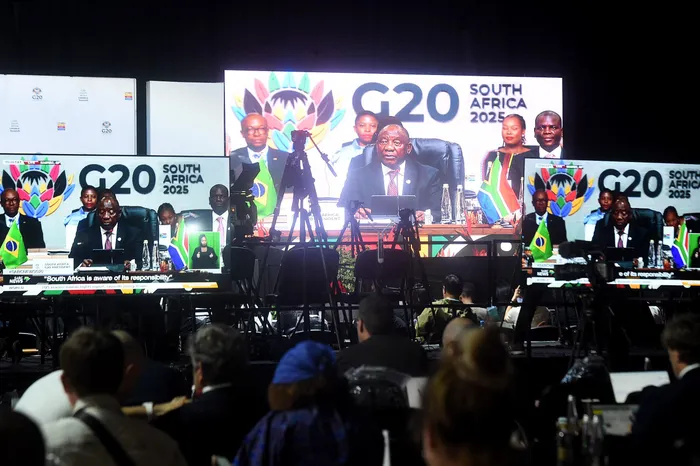
President Cyril Ramaphosa makes his opening remarks at the G20 Leaders' Summit held at the Nasrec Expo Centre in Johannesburg on Saturday.
Image: Itumeleng English / Independent Newspapers
As leaders gathered for the opening of the G20 Leaders' Summit on Saturday, South Africa used its presidency of the bloc to deliver a forceful message that tackling inequality must be at the heart of global economic cooperation if the world is to secure a stable and prosperous future.
President Cyril Ramaphosa, opening the Summit in Johannesburg, said South Africa was “deeply aware of the profound responsibility” that comes with steering the G20 and had spent the past year ensuring the priorities of the Global South, particularly the fight against inequality, were firmly embedded in the group’s work.
By promoting equality, we strive to ensure fair treatment and equal opportunities for all individuals and nations.
The disparities in wealth and development within and between countries is not only unjust and unsustainable. It is also one of the greatest impediments to sustainable growth.
It is essential that we break down divisions of economic status, gender, race and geography.
“In promoting equality, we strive to ensure fair treatment and equal opportunities for all individuals and nations,” Ramaphosa said.
“The disparities in wealth and development within and between countries is not only unjust and unsustainable. It is also one of the greatest impediments to sustainable growth. It is essential that we break down divisions of economic status, gender, race and geography.”
The President warned that inequality is no longer simply a development concern, but a structural risk to global stability, security and long-term economic resilience. Deepening divides in income, access to resources, climate vulnerability, and technological capacity, he said, undermine trust, fuel conflict, trigger population movements and weaken global markets.
This comes as more than two dozen former Heads of State and government have called on G20 leaders to establish a global body to “help the world address the inequality emergency”, urging the creation of an International Panel on Inequality ahead of the G20 Leaders' Summit in Johannesburg this weekend.
The proposal – described as an “IPCC for Inequality” – is contained in a new report compiled by the G20 Extraordinary Committee of Independent Experts on Global Inequality, chaired by Nobel Prize–winning economist Joseph Stiglitz.
The report will be presented during the opening session of the Summit on Saturday.
In an open letter released on Friday, former Colombian president and Nobel Peace Prize laureate Juan Manuel Santos; former Norwegian prime minister Gro Harlem Brundtland; former Swedish prime minister Stefan Löfven; Spain’s former prime minister José Luis Rodríguez Zapatero; former Malawi president Joyce Banda; former New Zealand prime minister Helen Clark; and former Irish Taoiseach Leo Varadkar were among the prominent signatories calling inequality “the crisis that sits at the root of many others.”
They argue that worsening global inequality is contributing to everything from poverty and climate disruption to stagnant living standards, warning that “rising inequality erodes public life” and threatens “the health of democracy itself.”
The proposed International Panel on Inequality, they argue, must assess how major global forces — including trade, technology, and artificial intelligence — shape inequality and must “let the facts lead”, highlight inequality trends; and assess impartially the impacts of policies on addressing the divide.
South Africa’s G20 Presidency has adopted the theme “Solidarity, Equality and Sustainability”, underscoring the view that the global community cannot tackle challenges such as climate change, energy insecurity or sluggish economic growth while leaving vast populations behind.
“This is important in an interconnected world, where the challenges faced by one nation affect all nations,” Ramaphosa said.
“Through solidarity, we can create an inclusive future that advances the interests of people around the world who are at the greatest risk of being left behind.”
He stressed that Africa’s development needs — from infrastructure to industrialisation to climate financing — must be recognised not as charity, but as critical global priorities that will shape the world’s economic future.
The President said meeting the UN Sustainable Development Goals by 2030 requires “greater and faster progress,” noting that inequality, unemployment and extreme poverty continue to threaten global stability. Thriving, inclusive economies, he argued, are essential to breaking these cycles.
“Thriving economies lift people out of poverty, encourage greater investment and trade, and generate the revenue needed to invest in public goods,” he said, adding that this is why South Africa has pushed for a permanent focus on Global South development issues in the G20.
BUSINESS REPORT

President Cyril Ramaphosa makes his opening remarks at the G20 Leaders' Summit held at the Nasrec Expo Centre in Johannesburg on Saturday.
Image: Itumeleng English / Independent Newspapers
Related Topics: